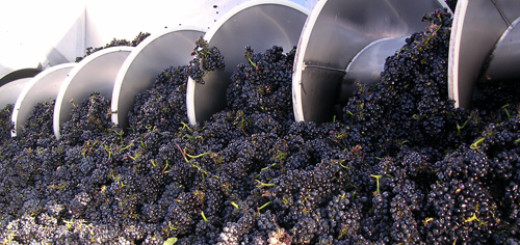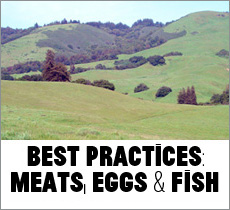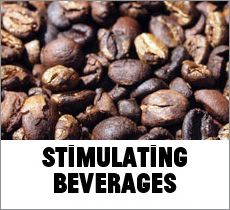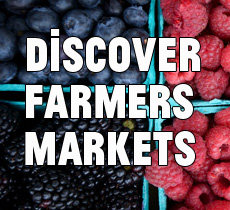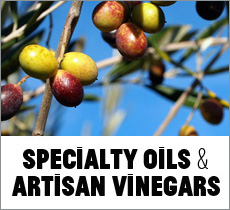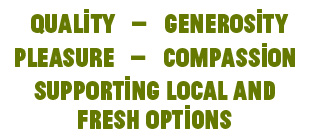A Simple Solution for Nutrition Confusion
To gluten or not to gluten? That is the question on the minds of many Americans as well as whether fish oil is right for them, if they should stop taking calcium supplements just a few years after their doctor told them to start, and what the heck is lycopene anyway? We suffer from a serious case of nutrition confusion that keeps many Americans from taking more steps toward health. Business and the media whip up this complicated soup about eating healthy but, if we follow the lead of two California health professionals who presented at the Monterey Bay Aquarium’s Sustainable Foods Institute and Cooking for Solutions, we can simplify the path to making better nutrition choices for life.
An Urgent Call to Action to Improve the American Diet

Simple tools for preparing real food
Of all the presentations and discussions across the two days of the Sustainable Foods Institute, the bucolic morning session at the bountiful, beautiful Earthbound Farm offered speakers the most fired up with a palpable urgency about the desperate need for change. Every single day in their work with Americans across the country, registered dietician Ashley Koff and physician Preston Maring see the negative impacts of a diet filled with processed, unnatural components that the body can’t recognize. When it can’t “read” a food that’s been extensively processed or genetically modified into a commercially-desirable form, the body must work harder to extract what it can recognize. “The body is really intelligent,” declares Ashley, “When it gets what it recognizes, it works beautifully.”
Unfortunately, junk food and other products generated by the industrial food system cloud our internal messaging system and make the body work overtime to access a diminished array of nutrients. This is especially true for modified protein sources like the looming AquaBounty(TM) salmon, given the fact that proteins and fats impact everything in the body and engage with the body’s entire messaging system. Environmental toxins of all sorts including pesticides, synthetic fertilizers, and unrecognizable genetic material impact our fat cells in a way that can leave a body both overweight yet still lacking in the nutrients needed for daily energy and health.
“We’re fat and full of toxins because of the food we’re eating,” affirms Ashley. In her private practice, she helps her clients understand how food and nutrients work in the body as well as how to implement the medical recommendations they’ve received from their health care providers. When people eat products produced by the industrial food system, they unwittingly participate in a human chemistry lab project. The United States lags behind Syria, China, Russia and over sixty other nations that have already banned GMOs. “Some of these countries are not stalwarts of personal freedom and yet they have moved to ban these organisms,” observes Ashley.
By designing components that artificially stimulate an appetite for these nutritionally-deficient, heavily subsidized inferior foods, the industrial food system employees running these corporate lab experiments and their corporate employers promote increased eating and increased consumer spending. Sadly, this industrial food system is designed to increase corporate profits, not health. “We must become Qualitarians!” declares Ashley, who helps people identify better quality foods to incorporate into their diet, including if their only option is a convenience store, which remains the only grocery store for too many Americans.
How to Become a Qualitarian
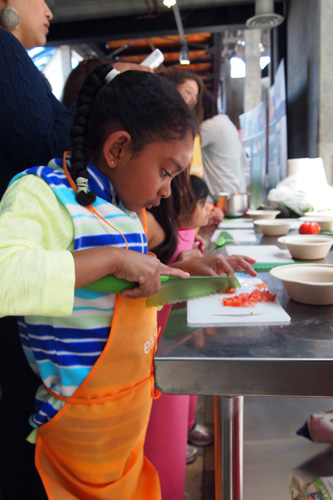
These knives are $4.95 each and kid-safe
The physician concurs with the registered dietitian: “We have to improve the quality of what people are eating.” In an effort to make this easier for individuals living in food deserts and to focus more on integrated, preventative care, Preston Maring helped start the first organic farmers market just outside the front doors of the Kaiser Permanente hospital in Oakland in 2003. He and his colleagues have helped bring higher quality food—fresh, organic, and locally produced—to individuals with compromised health who are arriving at and leaving from the hospital, making it easier than ever for them to purchase healthy, fresh food.
From 8 vendors at that first market—organized with assistance from the Pacific Coast Farmers’ Market Association—now 52 markets pop-up regularly at Kaiser Permanente facilities across the country as well as at over 50 other hospital systems. Working with Community Alliance with Family Farmers (CAFF) and Bay Area Physicians for Social Responsibility, he also helped bring together a number of Bay Area hospital systems and produce distributors to get sustainably-produced produce into the hospital kitchens and cafeterias to further enhance and accelerate health and wellness as well as to support the local farming community. A non-profit system of hospitals deeply committed to preventive care, Kaiser Permanente supports the development of effective tools to encourage and guide patients toward a healthier diet and lifestyle, including this guide for health care professionals to promote a more plant-based diet to patients and clients.
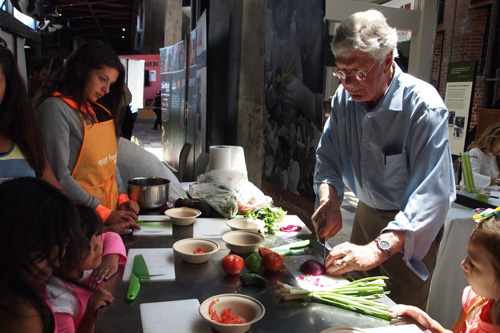
Demo of a simple salsa preparation at Cooking for Solutions in the Monterey Bay Aquarium
After 42 years of practicing medicine, Preston has witnessed the general decline of Americans’ health but he’s also seen the real improvements made possible when sick people shift toward a healthier diet. Quite simply, he argues, Americans need to begin eating a more sustainably-produced plant-based diet of quality foods if we are to reverse the national slide toward obesity, diabetes, heart disease and a host of other diet-related illnesses that threaten to bankrupt our future in a myriad of ways. We also need to learn to prepare vegetables, legumes, and other protein-rich foods in a way that makes them taste more delicious both for a child’s beginner palate as well as the adulterated adult palate that’s been conditioned over years to crave excessive sodium, sugar, and other subtle activators of the appetite inside highly-processed, engineered foods.
What Michael Pollan Said, Plus Sustainable
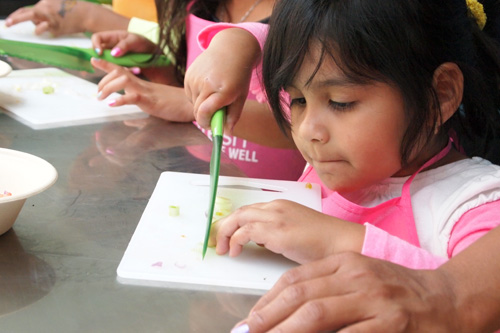
Begin learning kitchen skills early
A completely integrated ecosystem, the human body struggles when important diet and nutrition components are missing or destroyed in the foods we eat. Ashley explains how the epic rise in food intolerances and allergies directly links to the manipulation and over-processing of these foods. Digestive health is a keystone marker of overall health; when we gain extra weight in the belly region or experience discomfort after eating certain foods, these are the body’s warnings to us that it’s unable to access nutrients effectively in the foods and drinks we’re consuming.
“You know that diet Michael Pollan recommends: ‘Eat real food, not too much, mostly plants’?” asks Preston. “Add ‘sustainably-produced’ and this becomes the best description of a diet that can effectively move sick people towards health.” Ashley declares to have “zero doubt” that unnatural and highly modified foods directly link to the poor health of her clients. She’s seen it time and time again, she told the media- and chef-filled audience: “When we take people off these genetically modified foods, they get better. We can’t ignore that.”
Frankly, Ashley sounded a tinge exasperated at the stubborn tendency for some to suggest “Well, we don’t know for sure” that GMOs contribute to these serious health issues facing our nation. “We DO know,” she says from her perspective working with so many sick people—veritable science experiments—who improve immediately when they shift from a diet generated by the industrial food system’s salty-sugary-fatty chemical cocktail and toward an organic/GMO-free nutrient-rich plant-based diet.
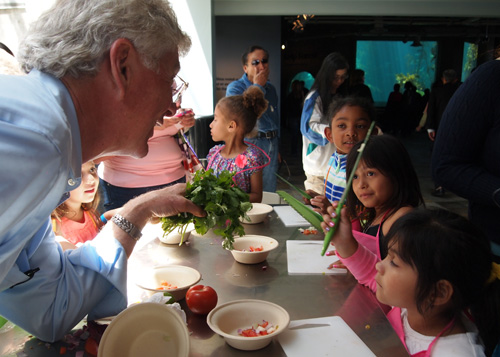
Preston Maring leads a cooking class for beginners: Monterey Bay Aquarium, Cooking for Solutions
Over our organic, largely locally-sourced breakfast at the Earthbound Farm picnic tables, Ashley and Preston emphatically pressed their unified message that Americans must engage with a more plant-based, sustainably-produced diet for improved and lasting health. Unlike other academic, theory-focused types who might feel that there are more important environmental issues to tackle than genetically modified organisms, these two health care professionals passionately believe that Americans are poisoning and polluting themselves with highly processed foods that compromise the health and future of our fellow citizens and our nation.
Preston and Ashley know there are many people who encounter serious obstacles in pursuing wellness. “The zip code of individuals could be more important than their genetic code in determining the chances for good health across a lifetime,” says Preston. These compassionate, determined health care providers agree: if we want to live in a country where we can all live lives of health and happiness, we must ensure that everyone can access quality food.
Easy Steps Toward Improved Health
Real health is not created in the hospital or a doctor’s office you might visit once a year: real health is created in the community. People and communities can tackle the problem little by little: just get started making small changes and they can add up to larger positive changes. Here’s a simple guide to clarifying the most important messages for addressing our national health crisis:
— Become a “Qualitarian”: Choose better quality food produced without toxic inputs or genetic modification. Organic always equals zero GMOs.
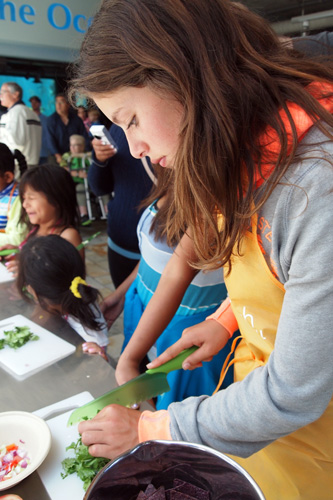
Older kids can learn cooking skills, too
— Simplify, simplify, simplify: A sharpened chef’s knife, a cutting board, and a drainage system (whether a salad spinner or a clean cotton towel with the four corners gathered and swung through the air) are all a family needs to take the first steps toward embracing a better diet for long-term health. Eat sustainably-produced real food, not too much, mostly plants.
— Learn to cook: Every American should learn to cook simple, healthy recipes that taste good. Get the kids involved in learning how to slice a tomato, apply simple spices, and make the magic of good food happen with their own hands as Preston demonstrated during the 2013 Cooking for Solutions. If you already know how to cook, share your love of fresh, flavorful food with those around you who don’t yet know the enjoyment of simple, delicious food cooked at home. Teach others.
— Reclaim your palate: Earthbound Farm co-founder and this session’s moderator Myra Goodman points out how she has never seen children pull carrots from the ground, clean them and eat them without saying that they now LOVE carrots. Get kids excited about eating vegetables that taste good by arranging farm tours with local, organic-focused farms. At home, roast vegetables to make them more delicious because, as Honored Educator of the Year Hugh Fearnley-Whittingstall said during this session’s question time, “Carmelization works” for adding layers of flavor.
— Teach your children well: Many parents and teachers report success with the simple project of discussing how to eat a rainbow of fruits and vegetables every day. Put some basic info on your kitchen’s refrigerator at kid’s-eye-level and review the colors and range of foods humans need to consume regularly for a healthy future. Farm tours like those offered at Earthbound Farm are always fun for kids, especially if it’s their first time visiting a farm. Connect young people to the flavor and reality of real food so they develop healthy habits for a lifetime.
[This article by was first published by Edible Monterey Bay in May 2012]

